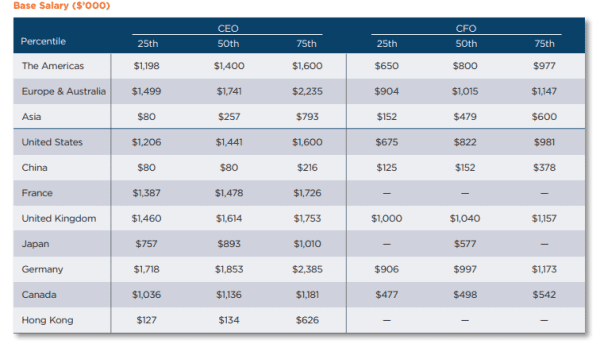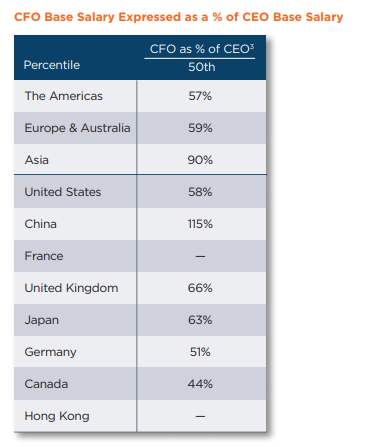Base salaries of CEOs in Asia are significantly below the global average: Report

As per the recent 2018 Global Top 250 Compensation Survey of CEOs and CFOs report by FW Cook and FIT Remuneration Consultants, base salaries in Asia are often significantly below the global average level.
The report is based on the largest 250 publicly traded companies worldwide by market capitalization (as of December 31, 2017). Based on geographic region, 54% of the constituents are composed of companies from the Americas, 29% from Europe & Australia, and 16% from Asia.
The survey reveals that pay levels in the Americas are typically higher than in the other regions, although base salaries are more modest relative to Europe & Australia and a significant majority of pay is linked to hitting performance targets over the short and long-term.
In general, base salaries in Europe & Australia are higher than in other regions, with total cash compensation (i.e., base salary plus annual bonus) being broadly in line with the Americas. Long-term incentives are more modest in Europe & Australia, and total pay is significantly lower than in the Americas as a result.

When it comes to Asia, pay levels and structure among Asian companies in the Global Top 250 are affected by the fact that a number of the largest companies in China and Hong Kong are state-owned enterprises and pay is therefore regulated. As such, base salaries and bonuses at these companies are not market driven and long-term incentives are generally not provided.
The report further notes that in Asia, pay is generally similar between CEOs and CFOs in terms of structure, balance, and levels given collective accountability in key decisions. The lack of long-term incentives in Asia is due to the heavy influence of state-owned enterprises in China whereby equity-based incentives are strictly regulated.
Key features of CEO and CFO compensation in Asia
• Base salaries are often significantly below the global “average” level when adjusting for company size due to the state-owned nature of some companies in Asia.
•Annual bonus levels are lower than in the other regions for both the CEO and CFO as bonuses are regulated in China and some senior executives in family-run businesses are also major shareholders of the company.
•Total cash compensation is usually significantly below the global “average” level when adjusting for company size. The state-owned nature of some Asian companies has led to substantially lower pay levels than their counterparts in the same industry with a similar scale. The pay gap between state-owned enterprises and the pure market is more significant at the CEO level.
•Long-term incentives are considerably less common in Asia than in the Americas or Europe & Australia as stock-based incentives are regulated among state-owned enterprises. For companies with long-term incentive plans, they are granted less frequently than other regions as long-term incentives are typically awarded in association with strategic events (e.g., pending initial public offering, shift in business strategies, or change of leadership team). Where long-term incentives are granted, they typically take the form of Stock Options.
•Total direct compensation is typically significantly below the global “average” level when adjusting for company size due to the aforementioned factors.
•At median, a CFO’s base salary is 90% of the CEO’s and a CFO’s total direct compensation is 82% of the CEO’s, largely influenced by the prevalence of state-owned enterprises.

Image Credits: Fwcook.com

















